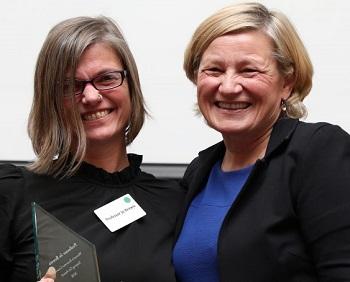Champion for mid-life working women recognised with award

Professor Jo Brewis (pictured on the left, with Dame Cilla Snowball, chair of the Women’s Business Council) has been awarded the Staying On Award 2018 by the Women’s Business Council, which is a business-led initiative to advise on how women’s contribution to economic growth can be optimised.
Recognised for her work in raising the profile of mid-life women workers, Professor Brewis collected the award at the Council’s ‘Five Years On’ report launch in November.
Professor Brewis’ expertise lies in the connections between the body, gender, sexuality, identity and organisations.
“I was delighted to be given the Staying On award for 2018: it is a real honour. The ceremony was testament to how much the Council has achieved in the last five years, and although we all accept there is a long way to go towards genuine gender equality in the workplace, I am very pleased to be able to play a part in the Council’s excellent work.”
Professor Jo Brewis
Professor Brewis was co-author of a government report in 2017, ‘The effects of menopause transition on women’s economic participation in the UK’ which led to her joining the Women’s Business Council. She is part of the Staying On Action Group, which focuses on maximising economic opportunities for older working women, including consideration of the impact of the menopause on women in or seeking employment.
With 51 the average age of natural menopause in industrialised countries, more women who are working will experience the menopause transition than ever before.
Speaking to the Staying On publication, Professor Brewis said: “Mid-life and older women say they feel invisible or marginalised at work. Women don’t feel able to speak out or disclose the fact that they have menopause transition symptoms. The perception, which is not necessarily the reality, is that they will be judged and treated differently if they say they are going through the menopause.”
Professor Brewis wants to normalise the menopause:
It’s inevitable, it’s universal, it’s natural. It can be difficult, but there are ways and means through which difficult symptoms can be managed. I think the other thing is, this is really demographically significant. Women are driving the increases in employment across the board in the UK, particularly in the older working group. The demographics of the UK labour force, and indeed across Europe and other industrialised countries, suggest we have to start paying attention to this now.
Professor Jo Brewis
Professor Brewis helped to create the Staying On – The Age of Success toolkit, which was launched in November 2017. Alongside her co-authors Dr. Vanessa Beck (University of Bristol) and Dr. Andrea Davies (University of Leicester), her continuing contribution to the Action Group is to highlight and work on plugging the evidence gaps that the report highlighted, such as how women in manual and/or low-paid work experience menopause, and comparing mid-life women workers to their mid-life male counterparts.
Read Professor Brewis’ article for The Conversation about why businesses should recognise the menopause.

Upcoming Events
Doing Academia Differently: Professional Development Symposium for Doctoral Students and Early-Career Academics
Tuesday, March 10, 2026 - 09:00 to 17:00
Michael Young Building, The Open University, Walton Hall, Milton Keynes, MK7 6BB
This one-day symposium on ‘Doing Academia Differently’ will provide inspiration and support for PhD and early-career academics to approach the complex tensions and dilemmas of contemporary academia in new and creative ways.
International Women’s Day: Supporting diverse new motherhoods for work inclusion
Thursday, March 12, 2026 - 11:00 to 12:30
Online Webinar - link below
This webinar from our GOP research cluster will discuss findings from research into how motherhood impacts employment for ethnic minority women.